
Plastics are a fast-growing component of municipal solid trash (MSW). While plastics may be found in all main MSW categories, containers and packaging had the greatest plastic volume in 2018, with over 14.5 million tonnes. Bags, sacks, and wraps; another packaging; polyethylene terephthalate (PET) bottles and jars; high-density polyethylene (HDPE) natural bottles; and other containers are all included in this category. Plastic also comes in use for the production of long-lasting items including appliances, furniture, lead-acid battery casings, and other things. This calls for the need for proper management of municipal solid waste.
Waste governance is getting more organized and regionalized across the world. Waste is often managed on a municipal or regional basis. For example, the volume and types of municipal solid waste generated in industrialised cities vary from those generated in other places. Hence localization is critical. As a result, towns must provide a municipal waste system that is both functional and efficient.
However, they frequently face a slew of issues that go beyond the municipal authority’s competence to manage municipal solid waste. These challenges are the result of complexity, a lack of financial resources, and a lack of structure. However, improper waste management alters ecosystems by polluting water, air, and soil. As a result, improper management of municipal solid waste i.e., disposal and recycling constitutes a serious environmental risk.
Incorrect collection and disposal of municipal solid waste in metropolitan areas is a major cause of environmental concerns. The waste streams generated by industrial solid waste sources differ from the dangerous compounds found in domestic garbage. This is a global problem that may wreak havoc on a variety of enterprises, from factories to farms, hospitals to hotels.
Improper disposal of municipal solid waste may lead to unhygienic circumstances, which can then lead to contamination of the ecosystem, such as The Great Pacific Garbage Patch. Therefore, it is an absolute need of the hour to educate people about the 3 R’s (Reduce, Reuse, Recycle) so that we can see progress at a local level.